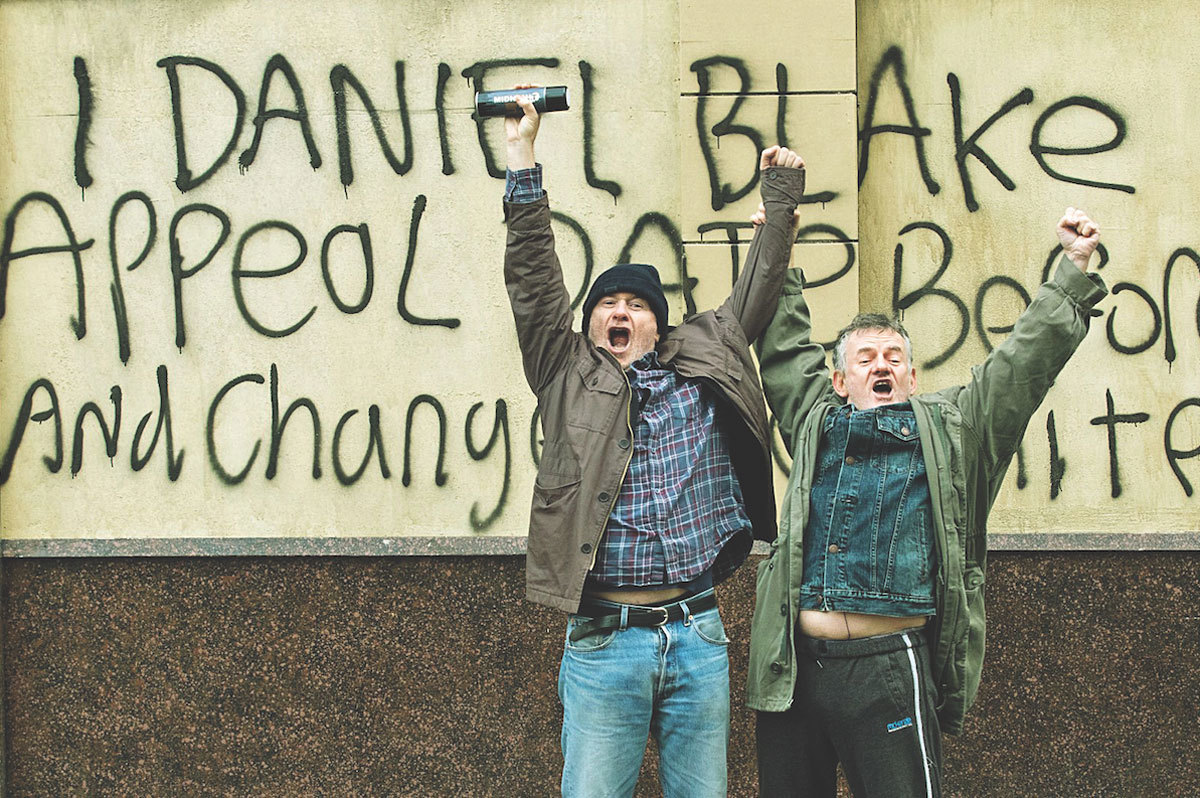Ken Loach’s long time producer Tony Garnett calls him “the most leftwing, subversive, director the country has ever known.” The right wing press and successive Conservative politicians have branded him dangerous and anti-British. And now, at 80, Loach is at the height of his powers with a film that takes aim at David Cameron’s Tory government and its welfare cuts.
He is also at his most popular. Last weekend, Loach’s film I, Daniel Blake posted the biggest ever opening for the veteran filmmaker in the UK. This says something. For a Friday night out at the cinema, I, Daniel Blake, is a tough sell at the box office.
The film, which won the Palme d’Or at Cannes earlier this year, tells the story of two people battling the bureaucracy of the welfare system in a bleak and economically depressed Newcastle. But cinema receipts suggest that there is a thirst for the kind of social realism in filmmaking that Ken Loach has made his own over five decades of work and which in I, Daniel Blake finds new, incendiary voice.
Loach struck a similar, popular note when he first emerged as a filmmaker in the mid 60s. His Wednesday Plays on the BBC were nothing short of revolutionary. They put working class faces on British television in a way like never before. The work resonated, with 12 million plus viewers tuning in to see the reality of life lived at the harsher end of the class spectrum. Homelessness, poverty and working class conflict with the system was all shown in the stark terms Loach became known for.
I, Daniel Blake shares much of the sensibility of Loach’s famed 1966 film, Cathy Come Home, which set a template for filmmaking that he has rarely wavered from. He wanted then, as now, to make cinema about real people in real locations. He often gave parts to non actors and told stories on their home turf, sticking to regional dialects. In I, Daniel Blake, the widower of the title is played by Newcastle born comic Dave Johns. Daniel Blake is a carpenter by trade who suffers a heart attack and relies on state benefits. Trapped in the bureaucracy of the welfare system, he befriends a single mother Katie [Hayley Squires] who has relocated up north from London in a bid to save money. She still needs food banks to survive.
In the film, Loach shot scenes at local food banks with real people who have need of them. Like all of his work, I, Daniel Blake, is shot documentary style, and in sequence so the actors get to feel their way through their predicament. Sometimes, things can get too authentic. In Kes, Loach’s iconic adaptation of the novel about a marginalised boy who finds his passion in falconry, a corporal punishment scene was played for real.
Against the odds – no major distributor wanted it – Kes became a hit on release in 1969 and is now regarded as one of the best British films of all time. Despite the acclaim, Loach struggled for a period in the late 70s and 80s to get finance for the kind of films he wanted to make on screen. In the 90s, he found his footing again. His films have moved between wider political conflicts to smaller kitchen sink dramas. He became widely acclaimed in Europe, praised for his idealism. His 2006 film, The Wind that Shakes the Barley, a story of the Irish revolt against British rule in the 20s, won the Palme d’Or at Cannes.
He might loved in France, at home, though, his politics have consistently met with resistance. I, Daniel Blake is no exception. As part of the press rounds for the film, Loach has tussled with Tory MPs over the existence of food banks under their watch. The Sunday Times journalist Camilla Long described the film as “a povvo safari for middle class people.”
Loach – and it seems cinema goers – appear undeterred. He makes no secret of his political leanings. He is a Jeremy Corbyn supporter and sees the Labour leader as someone with a vision to lead the country out of the kind of quandary depicted in I, Daniel Blake. Corbyn, for his part, attended the people’s premiere of the film.
It is politics that drives Loach. But it is also an idealism. He’d said his previous film, 2014’s Jimmy’s Hall, might have been his last; but the return to power of David Cameron’s Conservative government last year riled him enough to get him back to work. The retirement threat appeared genuine enough; he signalled the end of his career enough to allow a camera crew to follow him around for a documentary about his life’s work, during the filming of I, Daniel Blake.
In Louise Osmond’s affectionate tribute, Versus: The Life and Films of Ken Loach, the director explains why the work is so infused with politics. It shapes who we are, where we live, what school we go to, what our prospects in life are, he says. “If you make a film about people’s lives, politics is essential. It is the essence of drama; the essence of conflict.”
Loach hopes I, Daniel Blake connects with people. That they decide to fight back. It is – he concedes – only cinema. That is idealistic but perhaps it’s an idealism that many people currently share. Because so far, on the evidence of box office receipts, Ken Loach is connecting.
Credits
Text Colin Crummy
